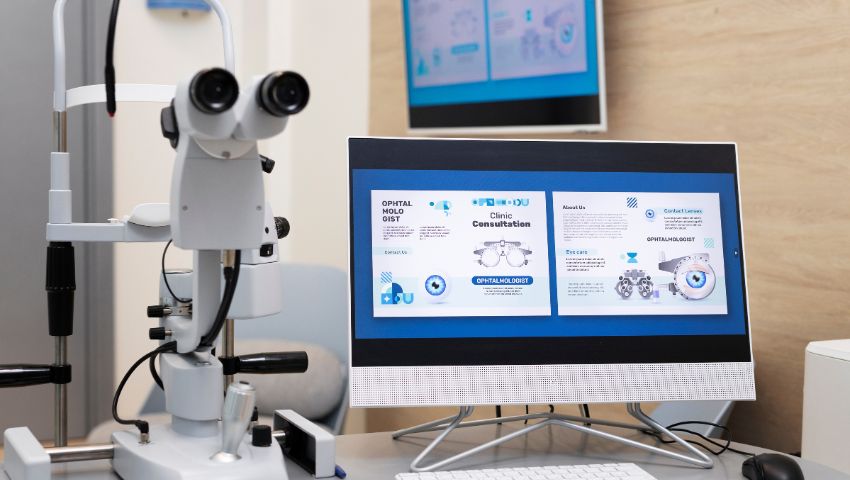
Table of Contents
- Introduction
- What is an Inbuilt CRM in Healthcare Software?
- Benefits of Inbuilt CRM in Modern Healthcare Software
- How Inbuilt CRM Improves Patient Relationships
- Key Features of Healthcare CRMs
- Conclusion
- FAQs
Introduction
Healthcare today goes beyond just medical treatment, it’s also about building strong patient relationships. To achieve this, hospitals and clinics rely on tools that streamline workflows and improve communication. An inbuilt CRM (Customer Relationship Management) within healthcare software plays a major role in improving efficiency and patient care.
What is an Inbuilt CRM in Healthcare Software?
An inbuilt CRM is a system integrated directly into healthcare software that helps hospitals manage patient interactions, track communication, and organize workflows without relying on external platforms. It eliminates the hassle of juggling multiple systems, making the process smooth for both patients and staff.
Benefits of Inbuilt CRM in Modern Healthcare Software
- Better Patient Engagement – Track communication history and personalize care.
- Seamless Data Management – Keep all patient details in one place.
- Reduced Administrative Burden – Automate reminders, follow-ups, and reports.
- Improved Patient Retention – Strengthen trust through consistent communication.
- Cost Savings – No need for third-party CRM integrations.
How Inbuilt CRM Improves Patient Relationships
With an inbuilt CRM, healthcare providers can keep a record of all patient interactions—appointments, test results, and follow-ups. Automated reminders ensure patients never miss visits, while doctors have access to complete histories. This leads to better trust, improved care, and stronger patient-provider relationships.
Key Features of Healthcare CRMs
- Appointment scheduling and reminders
- Patient communication logs
- Automated billing follow-ups
- Data-driven reports and analytics
- Integration with treatment and lab modules
Conclusion
An inbuilt CRM is no longer optional, it is essential for modern healthcare software. It ensures smoother workflows, better patient engagement and improved care delivery. By adopting solutions like Vitrify IVF software, healthcare providers can benefit from advanced CRM features seamlessly built into the platform, helping clinics scale efficiently while keeping patient satisfaction at the center.
Vitrify Pricing Plans
| 20 – 50 License | 50 – 100 License | 100+ License | |||
| Perfect for growing clinics needing flexible, scalable IVF management and secure operations. | Ideal for mid-sized clinics managing high patient volumes with seamless efficiency and care. | Built for large clinics demanding powerful, enterprise-level IVF solutions and complete scalability. | |||
| $19.99 Month/License |
$219.99 Year/License |
$17.99 Month/License |
$197.99 Year/License |
$15.99 Month/License |
$175.99 Year/License |
|---|---|---|---|---|---|
| ✔Appointment Scheduling | ✔Appointment Scheduling | ✔Appointment Scheduling | |||
| ✔Couple Registration | ✔Couple Registration | ✔Couple Registration | |||
| ✔Patient Records Management | ✔Patient Records Management | ✔Patient Records Management | |||
| ✔Basic Reporting | ✔Basic Reporting | ✔Basic Reporting | |||
| ✔Basic Invoicing | ✔Basic Invoicing | ✔Basic Invoicing | |||
| ✔Email Reminders | ✔Email Reminders | ✔Email Reminders | |||
| ✔SMS Reminders* | ✔SMS Reminders* | ✔SMS Reminders* | |||
| ✔WhatsApp Reminders* | ✔WhatsApp Reminders* | ✔WhatsApp Reminders* | |||
| ✔Essential Support | ✔Essential Support | ✔Essential Support | |||
| ✔MIS Reporting | ✔MIS Reporting | ✔MIS Reporting | |||
| ✔IVF Medical Record Management | ✔IVF Medical Record Management | ✔IVF Medical Record Management | |||
| ✔ART Cycle Management | ✔ART Cycle Management | ✔ART Cycle Management | |||
| ✔IVF Procedure Recording | ✔IVF Procedure Recording | ✔IVF Procedure Recording | |||
| ✔Basic Billing | ✔Basic Billing | ✔Basic Billing | |||
| ✔Limited Data Export (PDF) | ✔Limited Data Export (PDF) | ✔Limited Data Export (PDF) | |||
FAQs
1. What does a healthcare CRM do?
It helps hospitals manage patient communication, appointments and data in one system.
2. Why is an inbuilt CRM better than external CRM tools?
It integrates smoothly into hospital workflows without requiring multiple platforms.
3. Can an inbuilt CRM improve patient satisfaction?
Yes, by ensuring timely reminders, clear communication, and personalized care.
4. Is an inbuilt CRM cost-effective?
Absolutely, as it saves money on third-party tools and reduces manual work.
5. Does Vitrify offer an inbuilt CRM?
Yes, Vitrify provides a fully integrated CRM that supports patient engagement and hospital management.